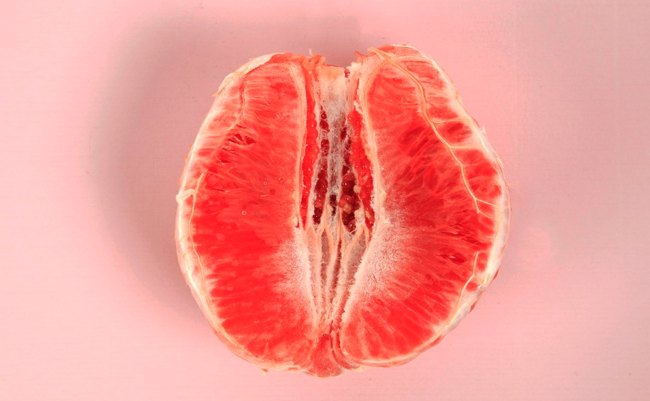
Even though age plays a factor, the vagina generally has an acidic pH, should contain high quantities of beneficial bacteria that help fend off infections, and is naturally lubricated. It is also important to note that a healthy vagina also secretes small amounts of discharge which means secreting anywhere from a teaspoon to tablespoon of of discharge per day. Discharge is a normal physiologic reaction and it’s essentially shedding of cervical and vaginal cells. Only start to worry if you’re producing too much discharge or if its accompanied by a foul odour or odd colour.
ALSO READ: This vaginal probiotic could be exactly what your vagina needs
If your discharge is comes with discomfort, whether it’s pelvic discomfort or vulvar discomfort, itching, or burning, that’s a problem and that change needs to be evaluated by a health professional.
Even though you may not realise it, following a balanced, healthy diet with lots of fruit and drinking plenty of water are both key to vaginal and reproductive health. In fact, certain foods may be effective in treating vaginal health problems.
Yoghurt can potentially help prevent yeast infections and aid in their treatment. It’s rich in probiotics, especially plain Greek yogurt, so if a woman is prone to yeast infections, taking a probiotic that is rich in Lactobacilli, or eating plain Greek yogurt every day can be helpful. If you’re prone to urinary tract infections, it may be helpful to take a cranberry supplement daily.
ALSO READ: Your magical vagina isn’t enough for a healthy relationship
Here are the 5 essential rules you need to follow for a healthy, happy, vagina!
1. Practice safe sex
Using condoms, be it male or female during sex helps to protect against sexually transmitted infections like HIV, genital herpes, syphilis, gonorrhea, genital warts, and chlamydia. Some of these, like HIV and genital herpes, have no cure. And others, such as the HPV virus are known to cause cancer.
You should change condoms when switching from oral or anal sex to vaginal sex, to prevent the mixing of harmful bacteria into the vagina. You should also avoid sharing sex toys with your partner because that’s another way of spreading STI’s.
2. Wear the right clothing
Your vagina should stay clean and dry and the material and clothes you wear can affect that. Certain types of fabrics and tight-fitting clothing create warm, moist conditions in which yeast thrive. When it comes to your underwear selection, your vagina has a preference: cotton. That’s why most undies come with a strip of cotton in the crotch so make sure you wear breathable cotton underwear and avoid thongs and nylon underwear. If you’re prone to yeast infections, change out of wet swimsuits and sweaty workout clothes as quickly as possible.
If you experience a lot of discharge and dampness during the day, take two pairs of underwear with you every day when you go to work or school, and change your underwear during the day. It’ll help you feel more comfortable and will help prevent infection.”
You can take it a step further by wearing no underwear at all when you’re just hanging around the house to let things air out.
3. Lube is your friend
Bringing out lube may seem like a mood dampener for some but trust us, your vagina will thank you for it. Vaginal dryness can impact you if you take certain medications like antihistamines, antidepressants, or hormonal birth control and it can lead to irritable and painful sex.
When this happens, make sure you’re communicating with your partner so they don’t start having sex before you’re well-lubricated, because it’s uncomfortable and can even lead to abrasions in the vagina.
4. Get tested regularly
No matter how much or little you are sexually active, it’s important to get tested as often as your doctor recommends based on your respective risk factors, even if you’re in a monogamous relationship. STIs are not always symptomatic, and you may not even realise you have one until it’s too late,
Testing and diagnosis will help you get rid of any symptoms and figure out a treatment plan with your medical practitioner. When left untreated, conditions like gonorrhea and chlamydia can lead to pelvic inflammatory disease which can lead to chronic pelvic pain and fertility issues.
5. Wash after sex
Before intercourse and after, it’s extremely important to make sure yours and your partner’s genital areas are washed and clean. Vaginas are prone to infection when they come in contact with other body fluids and skin. Therefor, you must wash the area and your fingers with plain water to keep bacteria in check.
 Top Naija News – Nigeria News, Nigerian News & Top Stories Top Naija News – Nigerian Newspapers, Nigerian News. topnaijanews is a daily Nigerian newspaper covering Latest News, Breaking News, Entertainment, Sports, Lifestyle and Politics.
Top Naija News – Nigeria News, Nigerian News & Top Stories Top Naija News – Nigerian Newspapers, Nigerian News. topnaijanews is a daily Nigerian newspaper covering Latest News, Breaking News, Entertainment, Sports, Lifestyle and Politics.




